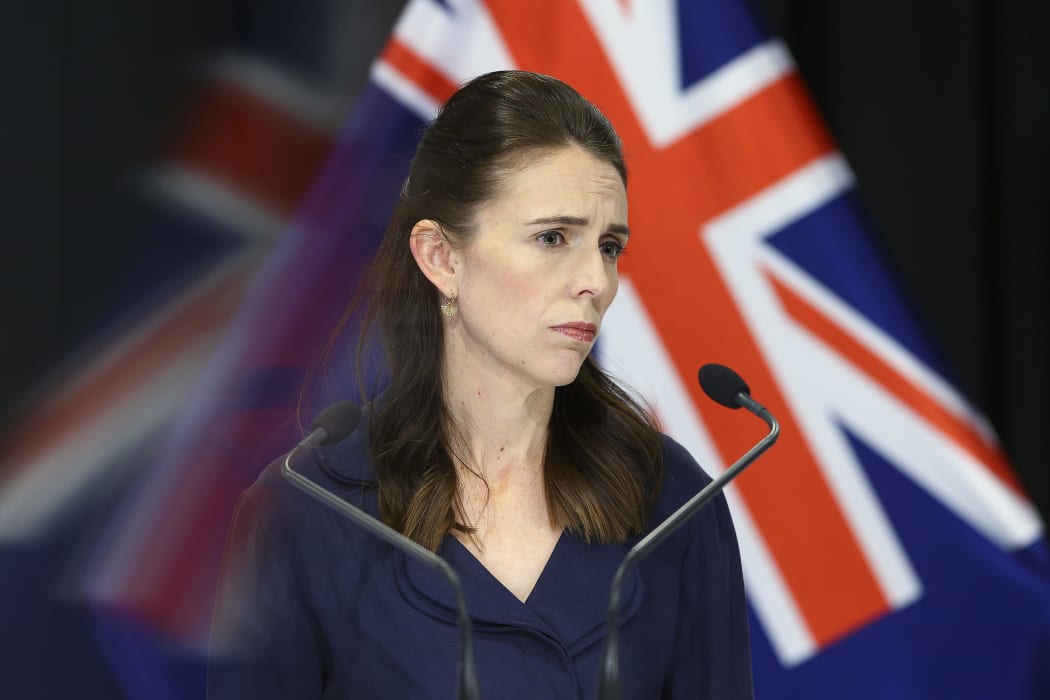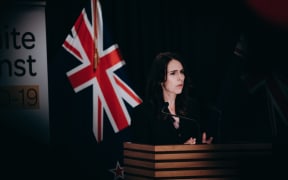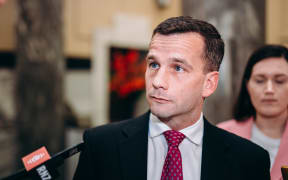By Peter Wilson*
As Covid-19 spreads around the world, it can be daunting keeping up with the information. For RNZ, our responsibility is to give you verified, up to the minute, trustworthy information to help you make decisions about your lives and your health. We'll also be asking questions of officials and decision makers about how they're responding to the virus. Our aim is to keep you informed.
Analysis: The indicators are good and alert level 3 is just around the corner, but it's been a rush job and confusion is already starting to emerge.

If Prime Minister Jacinda Ardern extends alert level 4 while the situation appears to be under control it would test public patience, Peter Wilson writes. Photo: Pool / Getty
Prime Minister Jacinda Ardern calls it the recovery room, a place we go to after surgery to make sure we're going to get better. If we don't, then it's back to the operating theatre.
That's a good description of level 3, and we'll all soon be there.
The indicators are good. The number of new cases has dropped steadily, the clusters are ring-fenced and random testing has started to make sure there isn't any undetected community transmission happening.
But while it might look safe enough, Ardern still has an intensely difficult decision to make on Monday. A serious outbreak after restrictions have been eased and a frantic return to level 4 would be a disaster, economically and socially, and she won't be absolutely sure that can't happen.
If it did happen she would risk losing the public support that was so strong in the beginning. She would have made the wrong call.
The alternative isn't much better. Extending alert level 4 while the situation appears to be under control and improving would severely test public patience. Businesses desperate to get back to work would be hugely disappointed and political unity would probably fracture.
Earlier this week the Treasury released a set of scenarios which clearly showed the economic impact of staying in lockdown for an extended period, horrifying figures with estimates of unemployment potentially rising to more than 20 per cent. Those scenarios will weigh heavily on the prime minister and her cabinet on Monday.
In Ardern's ideal world the transition to level 3 will happen smoothly from next week, the number of new cases will be down to single figures, businesses that have been allowed to open will know what they have to do and the public will obey the rules.
It's not going to be an ideal world. Government departments deserve praise for putting a new set of rules together so quickly, but they just didn't have enough time to iron out all the wrinkles.
Ardern acknowledged this yesterday when she outlined the Level 3 conditions, saying she knew there were going to be questions. She just has to hope MBIE has all the answers.
Education sector voices level 3 fears
Education was the first sector to fear chaos under Level 3. The government decided schools would open but attendance would be voluntary.
Under the relaxed restrictions there will be more people returning to work and many of them won't have alternative childcare options. That's the reasoning behind opening schools and early childhood centres for children up to Year 10.
Today teachers were telling RNZ it would be a shambles. They wouldn't know how many children to expect, they wouldn't know whether children were supposed to be at school, and they had all spent weeks gearing up for distance learning.
The children who do go to school have to be kept in classroom bubbles with limited interaction and playgrounds will remain closed. Ardern admitted there could be challenges, which teachers probably consider was an understatement.

Principals and teachers fear a shambles in schools, once the country moves to alert level 3. Photo: dglimages/123RF
Businesses must self-accredit under a regime designed to ensure they have put in place the necessary distancing and hygiene rules for employees. Face-to-face transactions with customers are still banned, delivery systems have to be worked out.
None of it will be easy but the teachers, the business owners and the stay-at-home families will get through it, just as they got through lockdown.
Uncertainty over duration
A big question that hasn't been answered is how long alert level 3 will last. Ardern was asked that at her press conference yesterday but didn't give a direct answer. It's not known whether she will put a time limit on it, as she did with the lockdown.
In reply, she talked about how the government looked at the situation in terms of Covid-19 transmission cycles. One cycle was two weeks, two cycles were a month. There will be intense testing throughout the period, and Dr Ashley Bloomfield, the director-general of health, has said even greater vigilance will be needed because a lot more people will be out of their bubbles.
Since she started talking about moving to Level 3, Ardern has tried hard to avoid the impression that it's a done deal and Monday's cabinet meeting will bang down the rubber stamp.
Ardern knows how vital it is to retain public confidence in her government's actions. She has been a great communicator throughout the crisis, and she has talked of the prize - eliminating Covid-19, something no other country has achieved.
"It will need a team of five million behind it, following the rules and trusting reach other," she said at the briefing yesterday. "I believe we can do it."
Finally, something entirely different to think about.
Talking to RNZ this week the former MP Sandra Lee said she thought the election, still scheduled for 19 September, would be really tough for small parties.
All the issues, plans and promises they would want to put in front of voters would seem peripheral to the crisis that has gripped the country. She has a point.
*Peter Wilson is a life member of Parliament's press gallery, 22 years as NZPA's political editor and seven as parliamentary bureau chief for NZ Newswire.
Read more about the Covid-19 coronavirus:
- See all RNZ Covid-19 news
- Your Covid-19 questions answered - from health and employment to managing anxiety
- A timeline: How the coronavirus started, spread and stalled life in New Zealand
- Covid-19 symptoms: What they are and how they make you feel
- Coronavirus: A glossary of terms
- The Coronavirus Podcast






